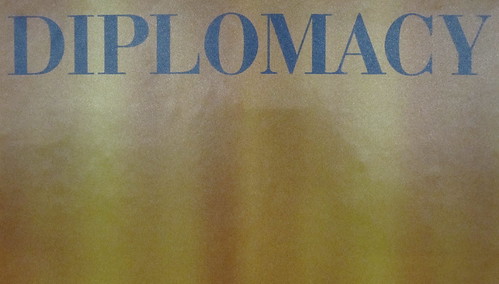
Since late January, I’ve had the privilege of teaching the introductory International Politics class at Haverford College just outside of Philadelphia. One of the benefits of teaching bright undergraduates (mainly freshmen and sophomores) is that they come to the study of international relations from such a different perspective than my own that classroom interactions are often interesting and thought-provoking. The other major benefit is the opportunity that it has provided for me to go back and re-read some international relations classics.
As WOTR [War On The Rocks] is a den of realists, I thought I would go back to the roots of modern realism and examine one aspect of Hans J. Morgenthau’s magnum opus Politics Among Nations: diplomacy. For many, this book encapsulates and defines many of the core premises of realism. While dismissed as being too normatively prescriptive by some, it is still a useful primer. This is a particularly important topic today while the U.S. is recalibrating its instruments of power (mainly by decreasing them) and global commitments and particularly operating in a world that is teeming with geopoliticians such as Vladimir Putin and Bashar Assad who seem quite willing to push back against America’s global interests.
For Morgenthau, diplomacy must:
- determine its objectives in light of the power actually and potentially available for the pursuit of these objectives;
- assess the objectives of other nations and the power actually and potentially available for the pursuit of these objectives;
- determine to what extent these different objectives are compatible with each other; and
- employ the means suited to the pursuit of its objectives.
He cautions that, “Failure in any of these tasks may jeopardize the success of foreign policy and with it the peace of the world.” This was valid thinking when Morgenthau put pen to paper and remains so today.
To carry out such diplomacy, he argued, nations had three tools at their disposal: persuasion, compromise, and the threat of force. But, you can’t fall too much in love with any one of these tools. To maximize diplomacy’s effectiveness, countries must blend and match these tools to best deal with particular problems and situations.
Morgenthau argued that there are nine rules for diplomacy; four “fundamental” and five relating to compromise. His four fundamental rules (with some added explanations) are:
- diplomacy must be divested of the crusading spirit (i.e., don’t get dogmatic);
- the objectives of foreign policy must be defined in terms of the national interest and must be supported with adequate power (his national interest for “a peace-loving nation” is its national security defined by the integrity of its national territory and its institutions);
- diplomacy must look at the political scene from the point of view of other nations (defined in terms of their national security); and
- nations must be willing to compromise on all issues that are not vital to them.
And his five largely self-explanatory, prerequisites for compromise are:
- “Give up the Shadow of Worthless Rights for the Substance of Real Advantage” [i.e., don’t be too legalistic or ideological]
- “Never Put Yourself in a Position from Which You Cannot Retreat Without Losing Face and from Which You Cannot Advance Without Grave Risks”
- “Never Allow a Weak Ally to Make Decisions for You”
- “The Armed Forces Are the Instrument of Foreign Policy, Not Its Master”; and
- “The Government Is the Leader of Public Opinion, Not Its Slave”.
Morgenthau’s prescriptions for prudence of action should be thought about, internalized, and applied when appropriate. This would greatly reduce unforced errors, although it would not save us from the misperceptions and miscalculations that often are responsible for crises. But, with these nine rules comes the rub for many Americans, and others.
For Americans of a realist bent, the issue is that, as my colleague Mac Owens has noted, “American realism has always fused the features of traditional realism—power and security—with prosperity and the preservation of American principles.” This sometimes gets us into trouble. Setting aside numerous other recent examples of the past fifteen years, President Obama’s recent warnings to Russia about the situation in Ukraine displays this tension between prudence and principles. It feels good to say the right thing about the situation in Ukraine, but at the end of the day, if the Russians decided to pull a 1956 Hungary or a 1968 Czechoslovakia, are we really going to risk a major war to aid democratic forces in Kiev? Likely not. Furthermore, could we fight such a conflict? We probably could, but it would cause a fundamental slewing of attention and capabilities. If you hate what the focus on the Middle East is doing to the Asian pivot then you are really going to hate a reversion back to focusing on Eurasia—unless you have a fetish for state-based great power struggles. We can register objections to be sure, but we have to be mindful of how others will read those objections. Making objections that are not credible will negatively impact our street cred and influence if they are seen by others (e.g., Putin or Assad) as bluffs.
This is a cross-post from War On The Rocks (WOTR).
Michael P. Noonan, a WOTR contributor, is director of the national security program at the Philadelphia-based Foreign Policy Research Institute.
For additional materials on this topic please see:
Moving Beyond Ambitions? Indonesia’s Military Modernization
For more information on issues and events that shape our world please visit the ISN’s Weekly Dossiers and Security Watch.

